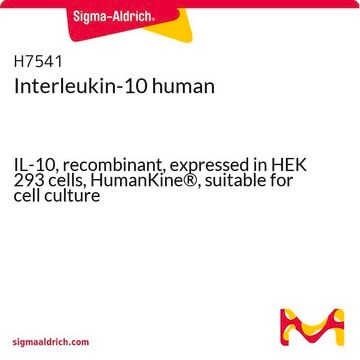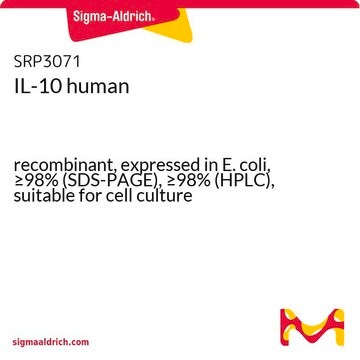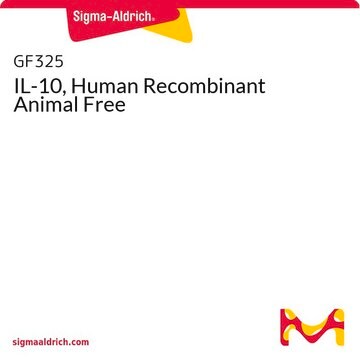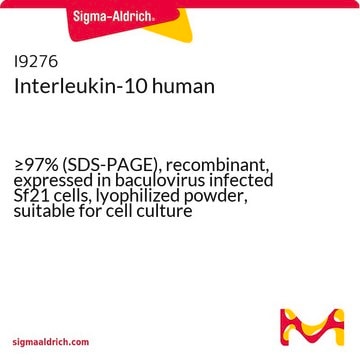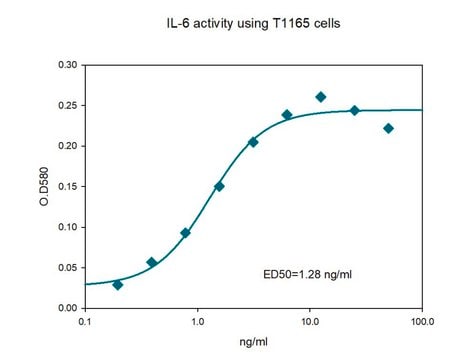SRP3312
IL-10 human
Animal-component free, recombinant, expressed in E. coli, ≥98% (SDS-PAGE), ≥98% (HPLC)
Synonym(s):
B-TCGF, CSIF, TGIF
Sign Into View Organizational & Contract Pricing
All Photos(1)
About This Item
UNSPSC Code:
12352202
NACRES:
NA.32
Recommended Products
biological source
human
recombinant
expressed in E. coli
Assay
≥98% (HPLC)
≥98% (SDS-PAGE)
form
lyophilized
potency
≤2.0 ng/mL
mol wt
18.6 kDa
packaging
pkg of 10 μg
impurities
endotoxin, tested
UniProt accession no.
shipped in
wet ice
storage temp.
−20°C
Gene Information
human ... IL10(3586)
General description
Interleukin-10 (IL-10) is an immunosuppressive cytokine produced by a variety of mammalian cell types including macrophages, monocytes, T cells, B cells and keratinocytes. Human IL-10 active on murine cells, but murine IL-10 is inactive on human cells. The gene encoding this protein is localized on human chromosome 1q31-32. Recombinant human IL-10 is an 18.6 kDa protein of 161 amino acid residues. Interleukin 10 (IL-10) comprises interferon IFN-γ fold and exists as a symmetric homodimer. It shares structural similarity with interferon γ (IFN-γ).
Application
Interleukin 10 (IL-10) human has been used in enzyme-linked immunosorbent assay.
Biochem/physiol Actions
Interleukin-10 (IL-10) is an anti-inflammatory protein that inhibits the expression of proinflammatory cytokines such as IL-1 and tumor necrosis factor-α (TNF-α). Like IL-4, IL-10 enhances humoral immune responses and attenuates cell-mediated immune reactions. It inhibits the production of IFN-γ and antigen-specific proliferation of type-1 T helper cells (Th1). It protects the host tissue from damage during immune responses. The protein has a role in modulating viral immunity. IL-10 enhances cytokine production, natural killer cell proliferation and cytotoxicity in vitro. IL-10 is an immunosuppressive cytokine. It promotes wound repair and functions to resolve inflammation in the central nervous system. IL-10 mediates its signaling function through the interleukin receptors namely, IL-10RA and two IL-10RBs. The expression of IL-10 is regulated by signal transducer and activator of transcription 3 (STAT3) and suppressor of cytokine signaling-3 (SOCS3) ratios. Polymorphisms in the IL-10 gene is implicated in breast cancer.
Physical form
Lyophilized from 20 mM Sodium Phosphate, pH 7.2.
Reconstitution
Centrifuge the vial prior to opening. Reconstitute in water to a concentration of 0.1-1.0 mg/ml. Do not vortex. This solution can be stored at 2-8°C for up to 1 week. For extended storage, it is recommended to further dilute in a buffer containing a carrier protein (example 0.1% BSA) and store in working aliquots at -20°C to -80°C.
Storage Class Code
13 - Non Combustible Solids
WGK
WGK 3
Flash Point(F)
Not applicable
Flash Point(C)
Not applicable
Certificates of Analysis (COA)
Search for Certificates of Analysis (COA) by entering the products Lot/Batch Number. Lot and Batch Numbers can be found on a product’s label following the words ‘Lot’ or ‘Batch’.
Already Own This Product?
Find documentation for the products that you have recently purchased in the Document Library.
Customers Also Viewed
IL-10: A Multifunctional Cytokine in Viral Infections
Jose M. Rojas
Journal of immunology research (2017)
Infection of human macrophages and Dendritic Cells with Mycobacterium tuberculosis Induces a Differential Cytokine Gene Expression That Modulates T Cell response
Journal of Immunology (2001)
Elnaz Sheikhpour et al.
Reports of biochemistry & molecular biology, 7(1), 30-37 (2018-10-17)
Interleukin (IL)-10, a multifunctional immune-regulatory cytokine with both immunosuppressive and anti-angiogenic functions, is produced by immune cells including macrophages, T lymphocytes, and natural killer cells. Among other effects, IL-10 promotes tumor cell proliferation and metastasis via immunosuppression. Interleukin-10-mediated immunosuppression is
K Josephson et al.
Immunity, 15(1), 35-46 (2001-08-04)
Interleukin 10 (IL-10) is a dimeric cytokine that plays a central role in suppressing inflammatory responses. These activities are dependent on the interaction of IL-10 with its high-affinity receptor (IL-10R1). This intermediate complex must subsequently recruit the low-affinity IL-10R2 chain
Amanda R Burmeister et al.
Frontiers in cellular neuroscience, 12, 458-458 (2018-12-14)
Resident cells of the central nervous system (CNS) play an important role in detecting insults and initiating protective or sometimes detrimental host immunity. At peripheral sites, immune responses follow a biphasic course with the rapid, but transient, production of inflammatory
Our team of scientists has experience in all areas of research including Life Science, Material Science, Chemical Synthesis, Chromatography, Analytical and many others.
Contact Technical Service